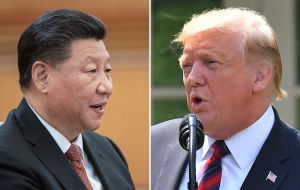MercoPress. South Atlantic News Agency
At least a month before US imposes more tariffs on US$ 300bn of Chinese products
 U.S. President Donald Trump, has threatened to slap tariffs of up to 25% on an additional list of Chinese imports worth about US$300 billion.
U.S. President Donald Trump, has threatened to slap tariffs of up to 25% on an additional list of Chinese imports worth about US$300 billion. 
 The timeline means the next levies could be ready for the time when Trump is expected to meet President Xi Jinping at a G20 summit in Japan June 28/29
The timeline means the next levies could be ready for the time when Trump is expected to meet President Xi Jinping at a G20 summit in Japan June 28/29The United States is at least a month from enacting its proposed tariffs on US$ 300 billion in Chinese imports as it studies the impact on US consumers, U.S. Treasury Secretary Steven Mnuchin said on Wednesday.
Washington this month hiked existing tariffs on US$200 billion in Chinese goods to 25% from 10%, prompting Beijing to retaliate with its own levies on U.S. imports, as talks to end a 10-month trade war between the world's two largest economies stalled.
U.S. President Donald Trump, who has embraced protectionism as part of an “America First” agenda aimed at rebalancing global trade, has threatened to slap tariffs of up to 25% on an additional list of Chinese imports worth about US$300 billion.
“There won't be any decision probably for another 30 to 45 days,” Mnuchin said in a hearing before the U.S. House of Representatives Financial Services Committee.
That timeline, which is accelerated compared to previous rounds of tariffs, means the next levies could be ready around the time when Trump is expected to meet Chinese President Xi Jinping at a G20 summit in Japan June 28-29.
“I'm still hopeful we can get back to the table. The two presidents will likely see each other at the end of June,” Mnuchin said, adding that the impact of tariffs on American consumers was a key consideration in the U.S. trade strategy.
Walmart Inc, the world's largest retailer, has said its prices will rise because of higher tariffs on Chinese goods.
Mnuchin said the Trump administration is open to holding new talks with China if the two sides can proceed on the basis of previous negotiations.
No high-level talks have been scheduled since the end of two days of discussions in Washington on May 10, the day Trump imposed the higher levies on Chinese goods.
The seeds of the current stalemate were sowed when Chinese officials sought major changes to the draft text of a deal that the Trump administration says had been largely agreed.
The Chinese government's top diplomat Wang Yi said on Wednesday that China's door would always be open to further trade talks with the United States, but added that Beijing would not accept any unequal agreements.
Acrimony between the two countries has intensified since Washington put Chinese telecom equipment company Huawei Technologies Co Ltd on a blacklist that curbs Huawei's access to U.S.-made components last week.
The move is a potentially devastating blow for the company and has rattled technology supply chains and investors.
Some mobile operators, including the Ymobile unit of Japan's Softbank Corp and rival KDDI Corp, put launch plans for Huawei's new P30 Lite smartphone on hold on Wednesday.
U.S. firms said in a survey released on Wednesday they were facing retaliation in China over the dispute.
The American Chamber of Commerce in China and its sister body in Shanghai said members reported increased obstacles such as government inspections, slower customs clearances and longer waits for approval for licensing and other applications.
It said 40.7% of respondents were considering relocating or had relocated manufacturing facilities outside of China. Of the almost 250 respondents to the survey, which was conducted after the latest round of tariffs, nearly three-quarters said the levies were hurting their competitiveness.
The United States is seeking sweeping changes to China's trade and economic policies, including an end to forced technology transfers and theft of U.S. trade secrets. Washington also wants curbs on subsidies for Chinese state-owned enterprises and better access for U.S. firms in Chinese markets.
”The idea is not to have tariffs, the idea is for them (China) to treat our companies fairly,” Mnuchin said on Wednesday, and referred to the impact on U.S. agriculture, which has been among the targets of China's retaliatory tariffs.
U.S. Agriculture Secretary Sonny Perdue said last week a new aid package for farmers hurt by China's tariffs was likely to amount to between US$15 billion and US$20 billion, exceeding the up to US$12 billion in aid rolled out last year.




Top Comments
Disclaimer & comment rulesCommenting for this story is now closed.
If you have a Facebook account, become a fan and comment on our Facebook Page!